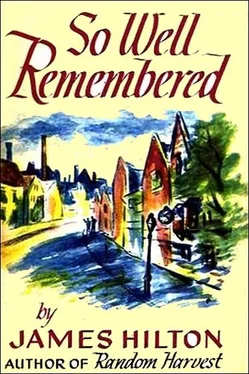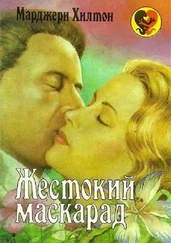Джеймс Хилтон - So Well Remembered
Здесь есть возможность читать онлайн «Джеймс Хилтон - So Well Remembered» весь текст электронной книги совершенно бесплатно (целиком полную версию без сокращений). В некоторых случаях можно слушать аудио, скачать через торрент в формате fb2 и присутствует краткое содержание. Год выпуска: 1945, Жанр: Проза, на английском языке. Описание произведения, (предисловие) а так же отзывы посетителей доступны на портале библиотеки ЛибКат.
- Название:So Well Remembered
- Автор:
- Жанр:
- Год:1945
- ISBN:нет данных
- Рейтинг книги:5 / 5. Голосов: 1
-
Избранное:Добавить в избранное
- Отзывы:
-
Ваша оценка:
- 100
- 1
- 2
- 3
- 4
- 5
So Well Remembered: краткое содержание, описание и аннотация
Предлагаем к чтению аннотацию, описание, краткое содержание или предисловие (зависит от того, что написал сам автор книги «So Well Remembered»). Если вы не нашли необходимую информацию о книге — напишите в комментариях, мы постараемся отыскать её.
So Well Remembered — читать онлайн бесплатно полную книгу (весь текст) целиком
Ниже представлен текст книги, разбитый по страницам. Система сохранения места последней прочитанной страницы, позволяет с удобством читать онлайн бесплатно книгу «So Well Remembered», без необходимости каждый раз заново искать на чём Вы остановились. Поставьте закладку, и сможете в любой момент перейти на страницу, на которой закончили чтение.
Интервал:
Закладка:
He nodded. And then at the last minute: “I wonder… do you know who I am?”
She replied, in a rather puzzled voice: “Why, yes—you’re the Mayor of Browdley, isn’t that it?”
“Aye,” he answered, with a slow smile. “And I’ll bet you’d never heard of Browdley till Charles told you. That’s how important it makes me.” He gripped her arm. “See you again soon, lass.” And then from the bus platform: “I’ll do what I can. I dunno how, but I will.”
Inside the bus and all the way to Browdley, by various slow-train connections that took all evening and half the night, George still did not know how he would keep his promise, though his determination to do so surged into the familiar dimensions of a crusade.
George might have a Machiavellian mind, as Charles had said, or he might have made a Jesuit, as Wendover had once said; but there were times when he knew that nothing is more effective than the direct approach. So after pondering long on the problem of how to help Charles, he decided that the first step must be to meet Livia himself and judge what help was needed; and to meet Livia the simplest method seemed to write and ask for a meeting.
She returned a characteristic brief note that he could visit her any time he wanted while she was at Castle Winslow.
It was a week before George could arrange to be away from Browdley long enough to make the trip, and once again there was the complicated uncomfortable journey by a series of trains. He was not surprised when no one met him at Castle Winslow station, and as it was fine weather and there were no cabs he walked the three miles from the station to the lodge gates, wearing down by sheer physical fatigue a mounting excitement over the fact that at last, after over twenty years, he was about to see Livia again. It was curious how something had lingered to produce that excitement still. He remembered the months immediately after he had known definitely that she would not return to him—how she had been on his mind night and day, so that he had scarcely been able to work; he remembered how he would wonder whether to avoid the Stoneclough road with all its memories, or to exorcise them deliberately by the self-torture of walking there; and how for weeks he would try the one method and then, in despair, the other. But for years now there had been nothing particular to remember or to try to forget.
At the lodge an old man hoeing potatoes in a patch of garden pointed further along the road when George spoke the name MRS. Winslow. “She’s at the Dower House—that’s about a mile. Turn left at the signpost and then it’s the first place on the right behind the trees. There’s a lot of kids there—you can’t miss it.”
George walked on, puzzled at the reference to ‘a lot of kids’, and more so when he came near enough to hear their shrill cries and screams. At length he glimpsed a rather large rambling house, well set back from the road behind tall poplars. In the space between the road and the building children of all ages from three or four to ten or eleven were romping as in a school playground.
George walked in and the children took no notice of him, but a buxom middle-aged woman who looked like a farmer’s wife changed her direction across the yard as he approached. He gave his name and repeated who it was he wanted to see.
“I don’t know whether she will,” answered the woman doubtfully. “She won’t see anybody as a rule. You’re not from a newspaper, are you?”
George assured her he wasn’t.
He waited till a moment later the woman beckoned him from a doorway. As she led him through the cool interior she explained the presence of the children. They had been bombed out of their homes in some of the big industrial cities, and this was one of the rehabilitation centres set up by the Government for the recovery of special cases—‘like shell-shock’, some of them, she said. George knew all about it, for there was a similar centre not far from Browdley, which he had visited. “And does Mrs. Winslow help in looking after them?” he asked, eager for some clue to what he might expect.
“Yes, she helps. She’s all right with the children.”
Presently the woman opened a door leading to a kind of verandah in which a few children were lying asleep or strangely awake in open cots. That strangeness was another thing George had seen before—the tense stare, the twitching muscles; these were the worst cases. And beyond them, arranging pots of geraniums along a ledge, was Livia. She wore a large, shabby straw hat and a bright-coloured dress.
At the instant of recognition he gasped with the sensation of something suddenly switched off inside him, but it was not pain any more; and as always when he had seen her afresh after an absence, recognition dissolved into a curious feeling of never having seen her before, but of experiencing some primitive thrill that time had neither enhanced nor made stale; but it was no longer a thrill entirely of pleasure.
“Livia…” he said.
She looked up. “Hello, George.” She gave him an odd sort of smile. She had not changed much in appearance—at least, not as much as he had expected. She went on: “I didn’t think you’d be coming today when you didn’t get here earlier.”
“I walked from the station.”
“Oh, didn’t Howard send the car? I asked him to.”
“Howard?”
“My brother-in-law. He probably didn’t do it deliberately. I mean he did do it deliberately. I mean, he deliberately didn’t send the car. Just because I asked him. He doesn’t like me. None of them do—except these.” As her eyes ranged over the cots something came into her face that made George reflect how beautiful she still was, provided one had ever thought her beautiful at all.
“Well, it didn’t matter. I enjoyed the walk.”
“Come into the garden.”
He followed her. She had been taking cuttings from geraniums, planting them in pots for the verandah, and without a word of apology or excuse she now resumed the task, and with such concentration that George did not feel she was giving him more than a part of her attention. At any rate, there was to be no such dramatic or over-dramatic encounter as he had half expected, and for this at least he was thankful.
He stammered: “I hope you’re well, Livia—after—after all the—the trouble—you’ve had.”
“Oh, I’m all right. Poor Jeff, though. He’s in Japan, only nobody knows where. If only the Government would send me out I’d find him—surely it’s possible by submarine? They could put me ashore on a dark night— like Casement in Ireland. Don’t they do that sometimes? Do you know anyone at the Admiralty you could ask? I told Jeff I would… People thought I was against his work—and so I was—because I could see all this coming. In Hong Kong, I mean. The place stank of what was coming… And then he had to go back into it all like a fool. I’d never have left him no matter where he went, but they took him away. They took him away, George. I wish I was with him still, even in a prison-camp. Where you are doesn’t really matter. The earth is all the same.” She began to pick up a handful of soil and sprinkle it into a pot. “I always liked planting things. Then you can let history slip through your fingers—like peasants do. That’s why I want Charlie to give up Cambridge and live on a farm.”
“To give up Cambridge?”
“Yes—what’s the good of it? We argued about it but he didn’t understand. Nobody ever does. They argue and argue but they don’t FEEL. It’s a little farm off the coast of Galway. I’d like him to settle down there and rest from thinking, arguing, books… all that… dead things that have caused all the upset…”
George watched her with curious intensity. She went on: “You don’t know what the world is all about, George. You never did. All your meetings and speeches—must have been thousands of them… what did they do? Or what did they stop?”
Читать дальшеИнтервал:
Закладка:
Похожие книги на «So Well Remembered»
Представляем Вашему вниманию похожие книги на «So Well Remembered» списком для выбора. Мы отобрали схожую по названию и смыслу литературу в надежде предоставить читателям больше вариантов отыскать новые, интересные, ещё непрочитанные произведения.
Обсуждение, отзывы о книге «So Well Remembered» и просто собственные мнения читателей. Оставьте ваши комментарии, напишите, что Вы думаете о произведении, его смысле или главных героях. Укажите что конкретно понравилось, а что нет, и почему Вы так считаете.










